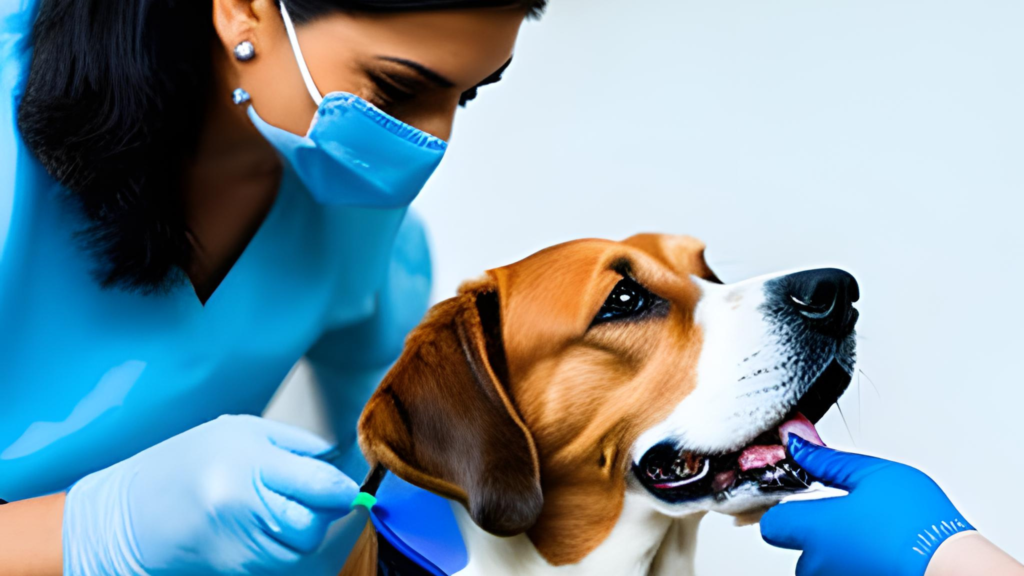Rattlesnake Vaccine for Dogs Pros and Cons – Protecting your dog from harm is a top priority as a pet owner. But what about the risk of a rattlesnake bite? That’s where the rattlesnake vaccine comes in. While the vaccine can provide protection, there are pros and cons to consider before deciding if it’s right for your furry friend. This article will explore the benefits and drawbacks of the rattlesnake vaccine for dogs.
What is a Rattlesnake Vaccine for Dogs?
The rattlesnake vaccine for dogs is a preventative measure designed to help protect your furry friend from the effects of a rattlesnake bite. The vaccine stimulates your dog’s immune system to produce antibodies that neutralize the rattlesnake’s venom. When a vaccinated dog is bitten, these antibodies help to reduce the severity of the reaction to the venom.
It is important to note that the rattlesnake vaccine does not guarantee that your dog will be protected from a rattlesnake bite. The vaccine is not a substitute for immediate veterinary care if a rattlesnake bites your dog. Still, it can reduce the severity of the reaction and give you more time to seek medical attention for your dog.
In addition, the vaccine only protects against the Western Diamondback rattlesnake, so it is ineffective against other species of rattlesnakes or venomous snakes.
How Does the Rattlesnake Vaccine Work?
The rattlesnake vaccine for dogs works by stimulating your dog’s immune system to produce antibodies against the venom of the Western Diamondback rattlesnake. The vaccine comprises small amounts of venom modified to be non-toxic while eliciting an immune response in the dog.
When a rattlesnake bites a vaccinated dog, the antibodies produced by the immune system bind to the venom, neutralizing its effects and preventing it from causing as much damage as it would in an unvaccinated dog.
It is important to note that the vaccine does not make your dog completely immune to rattlesnake venom. However, it can reduce the severity of the reaction and give you more time to seek medical attention for your dog. The vaccine is most effective when used in combination with other preventative measures, such as avoiding areas known to be inhabited by rattlesnakes and keeping your dog on a leash during walks.
Rattlesnake Vaccine for Dogs Pros and Cons

The rattlesnake vaccine for dogs has been much discussed among pet owners and veterinarians. Here are some of the pros and cons of using the vaccine to protect your furry friend from the dangers of rattlesnake bites.
Pros:
- Reduced risk of serious complications: While the vaccine is not a foolproof protection against rattlesnake bites, it does help reduce the severity of the symptoms and can prevent complications that may arise from such bites.
- Increased time for treatment: If a dog has been vaccinated, there is usually more time to get medical attention, as the vaccine provides time for the owner to seek veterinary care, especially if the vaccine was administered early enough.
- Can be an effective part of an overall prevention plan: Along with keeping your dog on a leash and avoiding areas where rattlesnakes are known to be present, the vaccine can provide an added layer of protection against rattlesnake bites.
Cons:
- Does not guarantee protection: The vaccine does not guarantee that a rattlesnake will not bite your dog or react severely to the venom.
- Only effective against certain types of rattlesnake venom: The vaccine only protects against the venom of the Western Diamondback rattlesnake and other closely related species.
- It may not be recommended for all dogs: Dogs with certain health conditions or those who have had previous reactions to vaccines may not be good candidates for the rattlesnake vaccine.
Pet owners should remain vigilant and know the signs of rattlesnake bites, including swelling, pain, and bleeding. They should also seek veterinary attention if they suspect their dog has been bitten. It is important to note that the rattlesnake vaccine is not a substitute for immediate veterinary care in case of a bite.
Also Read : Why Is My Dog Shaking After Vaccination? Best Guide
Who Should Consider the Rattlesnake Vaccine for Their Dog?
If you live in an area with a high risk of encountering rattlesnakes, the rattlesnake vaccine for dogs may be worth considering. This includes areas such as the Southwestern United States, where rattlesnakes are commonly found. Additionally, if you frequently take your dog on outdoor adventures, such as hiking or camping, the vaccine may provide an added layer of protection.
It is important to note, however, that the vaccine does not guarantee protection against snake bites. It is still recommended that you take precautions to avoid encounters with snakes, such as keeping your dog on a leash and staying on designated trails. If you come across a snake, it is important to remain calm and safely and quickly remove yourself and your dog from the area.
Ultimately, the decision to vaccinate your dog against rattlesnake bites should be made in consultation with your veterinarian, who can provide guidance based on your dog’s health and risk factors.
What to Expect When Getting Your Dog Vaccinated
Vaccinating your dog against rattlesnake bites can be smart for many pet owners. However, it’s important to understand what to expect when getting your dog vaccinated.
First, ensuring your dog is healthy enough to receive the vaccination is essential. Your veterinarian will likely perform a physical examination to ensure your dog is healthy before administering the vaccine.
When you arrive for the vaccination appointment, the veterinarian will provide you with information about the vaccine and what to expect. They will also discuss potential side effects and how to monitor your dog after the vaccination.
The vaccine is typically administered in two doses, with the second dose given 30 days after the first. Some veterinarians may recommend a third booster shot six months after the initial vaccination to ensure your dog remains protected.
After the vaccination, your dog may experience mild side effects, such as swelling, redness, or tenderness at the injection site. More severe reactions can occur in rare cases, such as vomiting, diarrhea, or difficulty breathing. If you notice any concerning symptoms, contact your veterinarian right away.
Vaccinating your dog against rattlesnake bites can provide peace of mind and potentially save your dog’s life. However, it’s important to carefully consider the potential risks and benefits and discuss them with your veterinarian before deciding.
Other Ways to Protect Your Dog from Rattlesnakes

While the rattlesnake vaccine can help reduce the severity of snake bites, it is not 100% effective and should not be relied on as the sole method of protecting your dog from snake bites. Here are some other ways to help protect your dog:
- Avoid areas with high snake populations: Do your research and avoid areas where snakes are known to be prevalent, especially during warmer months when snakes are more active.
- Please keep your dog on a leash: When hiking or walking, keep them on a leash so that you can better control their movements and keep them away from potential snake habitats.
- Teach your dog to avoid snakes: Train your dog to recognize and avoid snakes. Teach them to avoid areas where snakes are likely to be found and obey commands such as “leave it” or “stay.”
- Use snake-proof fencing: If you live in an area with a high population, consider installing snake-proof fencing around your property to keep snakes out.
- Keep your yard tidy: Keep your yard free of debris, tall grass, and other potential snake habitats.
Combining these strategies with the rattlesnake vaccine can help reduce the risk of your dog being bitten by a rattlesnake and increase their chances of a successful recovery if they are bitten.
Also Read : Do Dogs Have Uvulas? Unveiling the Mystery
Frequently Asked Questions about the rattlesnake vaccine for dogs:
What is the rattlesnake vaccine for dogs?
The rattlesnake vaccine is a type of vaccine that is designed to protect dogs from rattlesnake venom. The vaccine works by producing antibodies in the dog’s body that can neutralize the venom of certain types of rattlesnakes.
Is the rattlesnake vaccine effective?
The effectiveness of the rattlesnake vaccine can vary depending on the individual dog and the type of rattlesnake involved. However, studies have shown that the vaccine can significantly reduce the severity of symptoms and increase the chance of survival in dogs that rattlesnakes bite.
How long does the rattlesnake vaccine last?
The duration of the rattlesnake vaccine can vary depending on the brand and the individual dog’s immune system. Generally, the vaccine is recommended to be given annually for maximum protection.
Are there any side effects to the rattlesnake vaccine?
Like with any vaccine, the rattlesnake vaccine has a risk of side effects. Some dogs may experience mild side effects such as lethargy, fever, and swelling at the injection site. However, serious side effects are rare.
Can the rattlesnake vaccine replace other preventative measures?
While the rattlesnake vaccine can provide additional protection, it should not replace other preventative measures, such as avoiding areas where rattlesnakes are common, keeping dogs on leashes during walks, and training dogs to avoid snakes.
Is the rattlesnake vaccine safe for all dogs?
The rattlesnake vaccine is generally safe for most dogs. However, it is not recommended for dogs under 16 weeks of age, pregnant or nursing, or with a weakened immune system. It is also important to consult your veterinarian to determine if the vaccine is appropriate for your dog’s health.
Conclusion: Making an Informed Decision about the Rattlesnake Vaccine for Your Dog
Deciding whether or not to get your dog vaccinated with the rattlesnake vaccine is a personal decision that requires careful consideration. While the vaccine has its benefits, it also has some drawbacks that you should consider.
Before deciding, it’s important to consult with your veterinarian, who can help you weigh the risks and benefits for your dog and lifestyle. In areas where rattlesnake encounters are common, and the risk of envenomation is high, the vaccine may be a good choice for some dog owners.
However, it’s important to remember that the vaccine is not a guarantee of protection and should not be relied upon solely for your dog’s safety. Other measures should also be considered, such as avoiding areas with high snake populations, using snake-proof boots or leggings during hikes, and training your dog to avoid snakes.
By staying informed and taking the necessary precautions, you can help keep your dog safe from the dangers of rattlesnakes.
